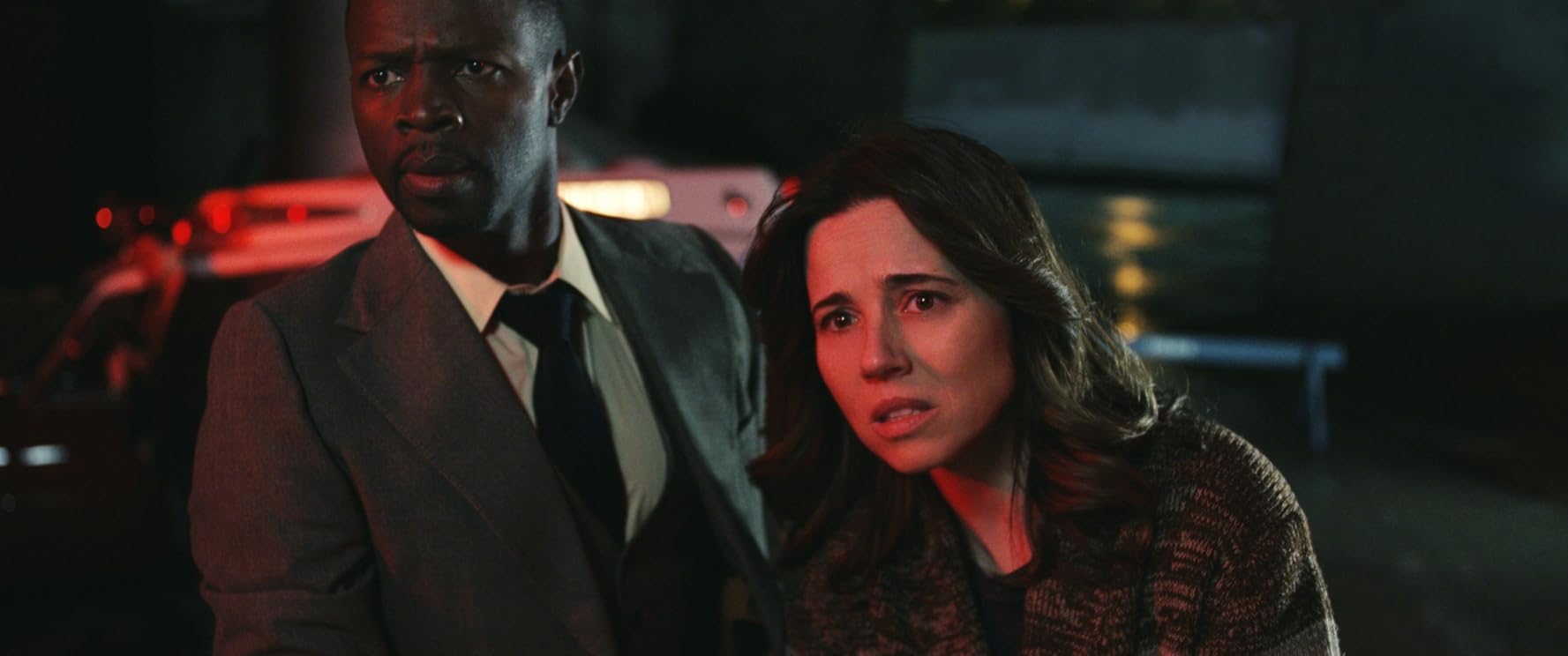 |
| Sean Patrick Thomas and Linda Cardellini in The Curse of La Llorona. Image courtesy Warner Bros. |
The
Curse of La Llorona
has a brilliant concept for horror. It's a ghost story about a woman
whose spirit is filled with unfathomable sadness. Her eternal despair
turns into a desire to start over again and again, abducting other
children from their mothers only to repeat the same tragic cycle
again and again and again. The idea is elegant in its simplicity,
touching directly on a number of fundamental fears of both parents
and children. Despite all of that, La
Llorona
can't find the horror in its own premise, churning out a movie whose
only saving grace is its accidental risibility.
La
Llorona
is rooted in a bit of Mexican folklore. As the movie tells it, the
eponymous spirit (played by Marisol Ramirez) discovers her husband
cheating on her and drowns her children to punish her husband. Once
she realizes what she's done, the woman begins an eternal quest to
replace her children with other children, only to drown them. Forward
a few centuries to 1973 and the spirit of the weeping woman takes the
children of single mother Patricia (Patricia Velasquez), partly
because of the actions of Child Protective Services worker and single
mother Anna Tate-Garcia (Linda Cardellini). Out of spite, Patricia
prays for La Llorona to take Anna's children (Roman Christou and
Jaynee-Lynne Kinchen), and the spirit begins to haunt the Garcia
family. Anna calls upon the help of former priest Rafael (Raymond
Cruz) to fend off the ghost and save her children from a rather dark
fate.
La
Llorona
doesn't understand why the folklore is as effective as it is. The
attempts at horror in this movie are less elemental and more
artificial, centering on jump scares and underwhelming CGI design to
shock the senses. What's missing is some profundity to the horror,
something that seeps below quick jolts that puts the proverbial
chills through a person's spine. There's no terror coming from the
situation Anna finds herself in, no reflection of the struggles Anna
has as a single mother. The film even goes out of its way to
incorporate a nuclear family – Rafael serves as father figure –
into the film's resolution to take away some of Anna's agency as a
parent. Any terror that might exist happens around Anna, but it never
emanates from her.
Absent
vital atmosphere, La
Llorona
banks a lot on numerous jump scares, those quick little moments that
give viewers a little jolt of fear, for its horror. For this to work
the jump scares have to be pretty darn close to perfect, hitting
audiences like a cannonball to the gut. This is not the case for La
Llorona.
At best the scares are predictable, easy to see from miles away and
often caused by a remarkably stupid decision from one of the
characters. They are about as poorly done as a jump scare can be,
completely ineffective at providing even the smallest goosebumps from
forming. Then again, the eponymous ghost herself is a poor source of
horror. Showing the ghost throughout the film – and she gets a lot
of screen time – puts a lot of effort on the filmmakers to make
that vision truly terrifying. But La Llorona as depicted in this film
is far more silly than scary. Her appearance is clumsy and awkward
with little effort given to make her seem properly bothersome. One of
her first major scenes, an attack on a couple of children, is
tremendously ridiculous, goofy enough to suck any terror out of the
fact that children are literally about to die. La Llorona also sadly
one note, the complexities of her story removed for a simple creature
that chases after children and has trouble with doors. Sympathy for
her plight is a potential source of horror – it results in a lot
self reflection from audiences – but that seems to be too complex
of an idea for La
Llorona
to implement.
This
film's one real saving grace is it's dedication to seriousness. La
Llorona
tries so, so hard to be scary it comes across as pretty hilarious.
Poor character decisions run rampant in this film, as do some
horribly tacky dialog and unconvincing line reads. It's not a so bad
it's good, but this film is kind of a hoot to sit with people who
call out the main characters for their idiocy or start laughing at
how bad the jump scares are. The best way to watch a bad movie is
with people who are really into it, morphing what could be pain into
a communal experience. Everyone gets to laugh together, and that's
about the best thing La
Llorona
has to offer.
Review: One and a half out of Five
Stars
Click here to see the trailer.
Rating: R
Run time: 93 minutes
Genre: Horror
tl;dr
What
Worked: Concept.
What
Fell Short: Jump
Scares, Ghost, Acting.
What
To Watch Instead:
Babadook,
The Devil's Backbone

